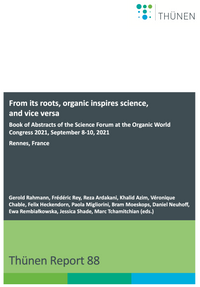6th ISOFAR conference at the 20th Organic World Congress 2021
Rennes, France, 8-10 September 2021
From its roots, organic inspires science, and vice versa
The scientific roots of organic systems are anchored in the four principles of IFOAM – Organics International: ecology, health, fairness, and care. Scientific skills are needed for the continuous improvement of organic food, systems, and culture.
The Forum invited researchers to share their work in the following five themes, with a special focus on interdisciplinary research (paper call text):
Ecological Approaches to Systems’ Health
The development of healthy organic systems needs to be addressed with ecologically sound approaches and at various scales (plot/herd, farm, and landscape). Health management, in a broad sense, can be designed at each of these scales with specific methods, but also by taking advantage of ecosystem services. Managing health also means growing systems autonomy and resilience to increase constraints and uncertainties (climate change, resource scarcity, emerging diseases, market volatility).
Product and Process Quality in Organic Agriculture: Methods and Challenges
One of the key objectives of organic agriculture is to produce food with high nutritional quality in sufficient quantities without compromising biotic and abiotic resources. The expectation of higher quality is a core motive for consumers in purchasing organic products. This quality, however, is dependent on appropriate management and can be compromised if best practices are not adopted.
Transitioning Towards Organic and Sustainable Food Systems
The transition to more sustainable food and farming systems needs to be implemented by a broad and diverse range of people. It concerns stakeholders engaged in an ongoing evolutionary process of transforming land, agroecosystems, territories, and food systems based on “Sustainable Development Goals” across different scales.
Consumers also have an important role to play, as they have the power to support transitions by their food choices and diets. Citizens can be co-designers of new agroecological food and farming systems.
Innovation in Organic Farming: “Thinking Outside of the Box”
Organic farming favours and needs innovation to push forward its goals while preserving its principles and identity. Innovations are not only technical or biological but also socio-economic. This triangle of
innovation allowed the organic sector to find specific, original, and, until now, successful pathways from food production to consumption. Nevertheless, the future global challenges are severe. “Thinking outside of the box” of today’s regulations, practices and markets is necessary to develop circular and stable organic food systems and to achieve the goals of organic farming: enough, high-quality and affordable food for everyone while maximizing environmental services and equitable social conditions throughout the value chains (cf. Organic 3.0). At the same time, with regard to the organic principles, the impact of new technology and innovation also needs to be assessed.
Political and Economic Frameworks as Drivers for a Vibrant Development of the Organic Sector
The organic sector relies on values and principles to guide its evolution and growth. Therefore, relevant regulations and processes are needed as socio-economic frameworks. Public and private policies influence these two pillars, principles, and regulations. They also influence the development of the organic sector through potential support and facilitation as well as through the organization and agreements on trade. These policies, along with the economic choices made by private companies, can represent hindrances or foster opportunities for the sector’s development.
The call for papers was released in spring 2019, resulting in 315 submissions from 40 countries. About117 qualified scientists reviewed the submissions in the context of the 5 themes in order to assess their scientific quality and their ability to stimulate scientific discussion. 98 paper have been accepted. Additional 107 papers with minor revisions are considered for the OWC21 as well.
Scientific discussions are critical for the development of research, not only in advancing knowledge and methodology but also in expanding innovation in approaches and visions. These discussions will provide the scaffolding for the 6th ISOFAR Conference of Organic Agricultural Science of the Organic World Congress in Rennes in 2021.
All authors agreed that all papers are uploaded to the public and free access online platform Organic Eprints and to be published in this Book of Abstracts of the Thünen-Report 88 2021. 19 papers have been already published in a special edition of the peer reviewed Journal of Organic Agriculture in Volume 10, supplement issue 1, in December 2020 (https://www.springer.com/journal/13165).

